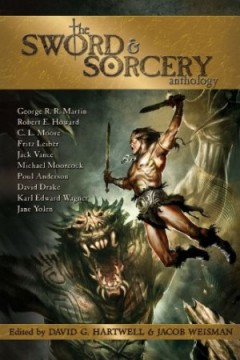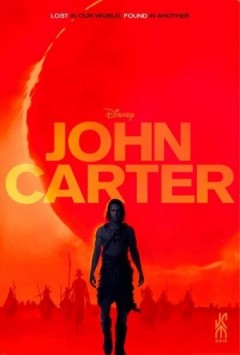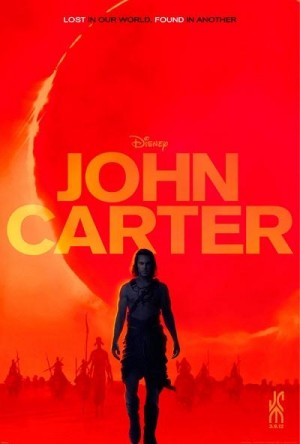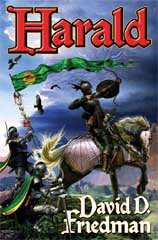
If you like your fantasy gritty, violent, personal, and character-driven, featuring flawed antiheroes, then you’ll want to listen to these two fascinating three-part series of podcast episodes on SF Signal.
Hosted and moderated by Patrick Hester and Jaym Gates, the panels include noted authors, editors, and artists, such as Lou Anders, Scott Lynch, James Enge, Saladin Ahmed, John Picacio, and many more.
The discussions are wide ranging: The panelists discuss what makes a story sword & sorcery (do you agree with Lou?), the proper length of a sword & sorcery story in prose form, and what the boundaries between sword & sorcery, sword & planet stories (Edgar Rice Burroughs’s John Carter), epic fantasy, and urban fantasy are. They talk about the new sword & sorcery (by authors Scott Lynch, Joe Abercrombie, James Enge, Michael Chabon, and others) in relation to its progenitors in the classic pulps (Robert E. Howard, Fritz Leiber) and the more mature work of Michael Moorcock, the proliferation of sword & sorcery into non-Western settings (e.g., sword & sandal stories by Saladin Ahmed and Howard Andrew Jones), and sword & sorcery in different mediums, such as film (Conan), table-top roleplaying games (D&D), contemporary video games (Skyrim), and art (Boris Vallejo).
After listening to all of these episodes, what’s your take on sword & sorcery?
[continue reading…]
Help Promote Prometheus Unbound by Sharing this Post

 There is a certain charm to the recently released John Carter, helmed by Andrew Stanton. The two leads, Taylor Kitsch’s John Carter and Lynn Collins’s Dejah Thoris, have enough chemistry to draw the audience in; the world of Mars itself is a treat for the eyes; the basic plot is well within the bounds of standard epic adventure but perfectly sound; and many of the situations that the characters find themselves in have real potential, albeit never fully realized. In short, there was a grand story there for the telling, had there been a director capable enough to pull it off. There was not, and consequently a theatergoer is likely to leave feeling frustrated by the large gap between what was and what might have been.
There is a certain charm to the recently released John Carter, helmed by Andrew Stanton. The two leads, Taylor Kitsch’s John Carter and Lynn Collins’s Dejah Thoris, have enough chemistry to draw the audience in; the world of Mars itself is a treat for the eyes; the basic plot is well within the bounds of standard epic adventure but perfectly sound; and many of the situations that the characters find themselves in have real potential, albeit never fully realized. In short, there was a grand story there for the telling, had there been a director capable enough to pull it off. There was not, and consequently a theatergoer is likely to leave feeling frustrated by the large gap between what was and what might have been.
After a useless prologue that actually ruins the later effect when the protagonist appears on Mars for the first time, we are introduced to John Carter, a former officer of the Confederacy and current gold prospector. When the United States army tries to conscript him to fight the Apaches in Arizona, he tells them he owes them nothing and prefers to go about his own business. This defiance of the state should not excite the libertarian too much, however, because just moments before, he was busy abusing the rights of a shop owner, refusing to leave the man’s store when he wouldn’t sell. Carter’s reticence to join and fight, it turns out, is more about his bleak personal cynicism after the deaths of his wife and child than it is about a freedom-friendly moral code.
In the course of his attempt to escape the clutches of the war machine, he stumbles upon a cave where he is ambushed by a strangely dressed man with seemingly magical powers (the reason for the ambush is never made clear, though one cannot help but notice that the plot would have come to a standstill without it). After killing the ambusher, Carter takes a medallion from his cadaver and gets transported to a strange land he eventually learns is the planet Mars. He discovers he has extraordinary new powers with which he amazes some of the creatures he finds there.
Eventually, he meets a woman, a princess, fleeing an arranged marriage that could stop a war between two city-states. She wants to use him and his incredible physical prowess for her ends, which are to save her city-state from destruction without getting married; he wants to use her for his, which are to return to Earth with the help of her esoteric knowledge of his amulet. They form a distrustful alliance and adventure ensues. I’ll leave it to the reader to guess whether or not they fall in love.
[continue reading…]
Help Promote Prometheus Unbound by Sharing this Post


A physicist by training and an economist by vocation, David Friedman, son of famed economist Milton Friedman, is best known in libertarian circles as the author of The Machinery of Freedom, a utilitarian case for anarcho-capitalism.
But David Friedman has also written two fantasy novels: Harald and Salamander. Recently, in two blogposts, he discussed the economics and physics in his fiction. Update: There is a third post on related matters (military logistics) in Harald; be sure to peruse the comments on this one.
In the first post, Friedman references a blogpost by an economist working at the New Zealand Institute of Economic Research about his realization that “Sci-fi needs economists.”1 He can take heart, perhaps, that science fiction authors are becoming more economically literate (or so Gregory Benford believes).
Reading Friedman’s posts reminded me of some things I read and listened to from L.E. Modesitt, Jr., a while back. A professional economist before becoming a full-time science fiction and fantasy author, Modesitt has also discussed how he incorporates the economic point of view into his work (see The Magic of Recluse, for starters) as well as the importance of understanding economics in order to write practical fantasy:
[continue reading…]
Help Promote Prometheus Unbound by Sharing this Post

 The Institute for Humane Studies, through its academic social network Kosmos Online, has an irregular podcast series on science fiction and liberty of the “Themes of Liberty in (insert favorite sci fi tv show/book/game here)” variety.
The Institute for Humane Studies, through its academic social network Kosmos Online, has an irregular podcast series on science fiction and liberty of the “Themes of Liberty in (insert favorite sci fi tv show/book/game here)” variety.
Here’s a list of the episodes so far:
Help Promote Prometheus Unbound by Sharing this Post

Dr. Uchronia
The history that didn’t happen can be just as interesting as the history that did.
This article is a small example of its own topic. Except by chance, I wouldn’t now be writing it. Not finding what I wanted while browsing in our library’s magazine aisles, I came across mention of “uchronie” in Le Nouvel Observateur. The philosopher Charles Renouvier chose this word as the title of his novel of 1857 and 1876; he coined it from Greek roots meaning “no time.” He was following the pattern set by St. Thomas More, whose Utopia derives from roots meaning “no place.” Utopia is a place that does not exist; uchronia is a time that did not exist. Uchronian works — to introduce the English adjective — are also called “what-if,” alternative, conjectural, or counterfactual history. They consider what would have happened if something else had chanced to happen.
Such works fall into two categories. The distinction is fuzzy but useful. Writings of the first kind, unlike actual history or a standard historical novel, are sheer fiction. They are not speculations about real events; they are stories that stand on their own. The Star Wars movies and Tolkien’s tales are good examples. Another is Islandia, a novel by Austin Tappan Wright, published posthumously in 1942. Wright describes events and personalities in a country on a fictional continent in the Southern Hemisphere before World War I. The people of Islandia, while highly civilized and advanced in philosophy and psychology, prefer their old ways, rejecting railroads and most other modern technology and narrowly limiting contact with the outside world. The reader (this one, anyway) drifts with the author into sympathy with the Islandian way of thinking.
Edward Bellamy’s Looking Backward (1887) projects an opposite vision, one intended as backward only in an ironic sense; it imagines a prosperous and happy socialist utopia of 2000. This uchronia actually exerted some influence in its time, converting many readers to socialism because they wanted to live in the world of Bellamy’s vision.
[continue reading…]
Help Promote Prometheus Unbound by Sharing this Post
With great solemnity, “Defense” Secretary Robert Gates imparted on West Point cadets this Friday a hard-earned pearl of newly discovered wisdom:
“In my opinion, any future defense secretary who advises the president to again send a big American land army into Asia or into the Middle East or Africa should ‘have his head examined,’ as General MacArthur so delicately put it,” Mr. Gates told an assembly of Army cadets here.
In other words, “Never get involved in a land war in Asia.”
Sounds like good advi… Wait,what? Not everyone knows this already? Inconceivable!
Any culturally literate person has seen The Princess Bride at least once in the last 24 years1 and certainly knows about the most famous classic blunder:
[continue reading…]
Help Promote Prometheus Unbound by Sharing this Post
Lots of news to catch up on with this post.
- Over a decade ago, a Russian paleontologist wrote an alternative take on the War of the Ring from J.R.R. Tolkien’s The Lord of the Rings. Recently translated into English, Kirill Yeskov’s The Last Ringbearer tells the tale from the point of view of Mordor, the bad guys in Tolkien’s epic.
History is usually written by the victors, but now the truth of the War of the Ring has finally come out. Gandalf is portrayed as a warmonger bent on destroying a bastion of civilization dedicated to reason, science, technology, and industrialization because science “destroys the harmony of the world and dries up the souls of men!” The elves are bent on world domination and Aragorn is a Machiavellian schemer whose strings are pulled by his wife, Arwen.
If you’re intrigued, you can learn more about The Last Ringbearer from the Salon.com article “Middle-Earth according to Mordor” and, also on Salon.com, the author’s own account of why he wrote the novel. You can download The Last Ringbearer for free and give it a read. Here’s to hoping Christopher Tolkien doesn’t aggress against Yeskov by launching a copyright or trademark infringement lawsuit.
- Finally, the print magazine, Analog Science Fiction and Fact, is entering the digital age and switching from snail mail to an electronic submissions system.
- In my previous news roundup, I posted the trailer of the upcoming movie adaptation of Ayn Rand’s Atlas Shrugged as well as some reports from people who had seen an advance preview and an interview with the producer. Here’s more footage, the scene in which Henry Rearden returns home and gives his wife a bracelet made from the first pouring of Rearden Metal:
[continue reading…]
Help Promote Prometheus Unbound by Sharing this Post














